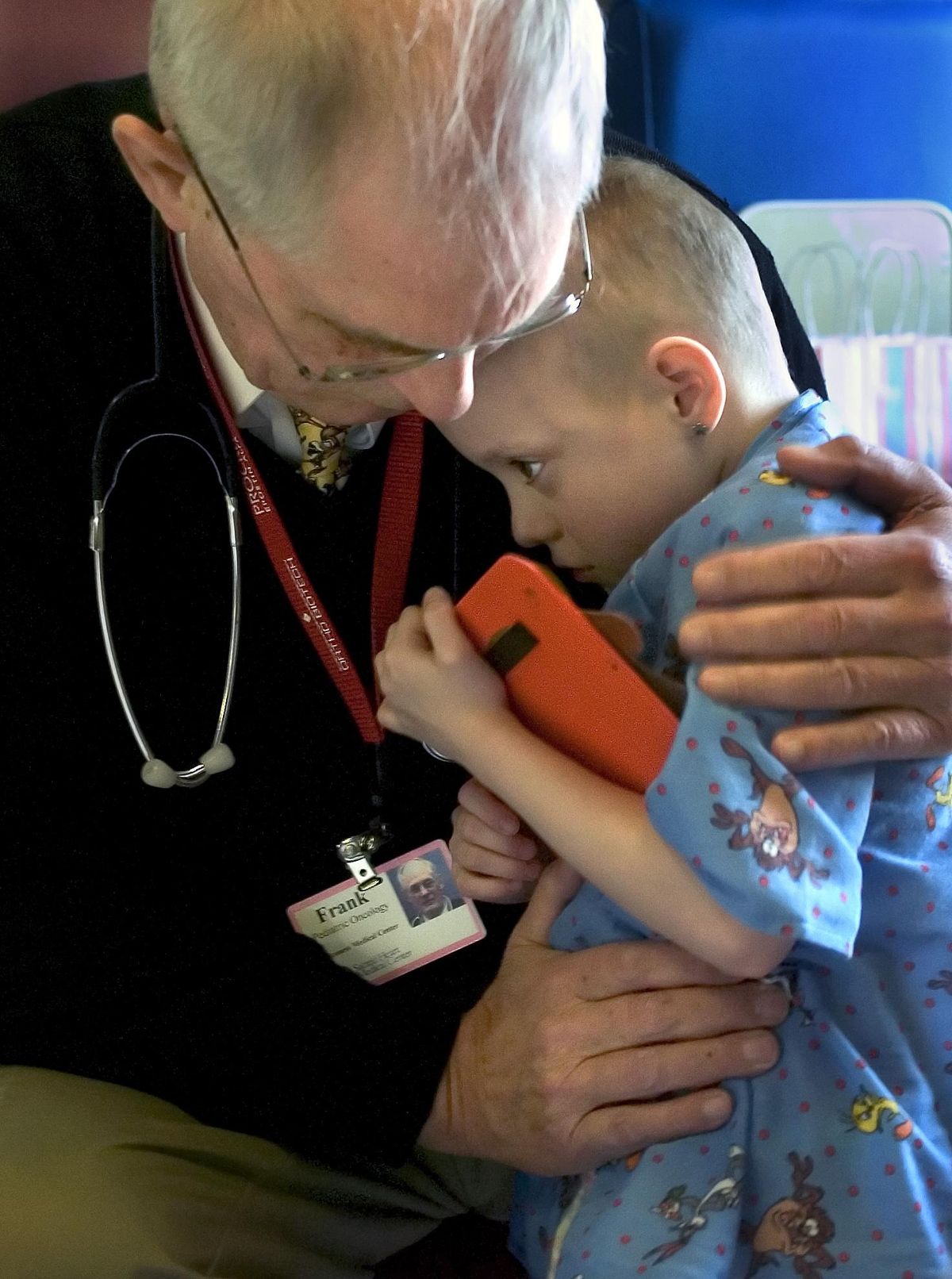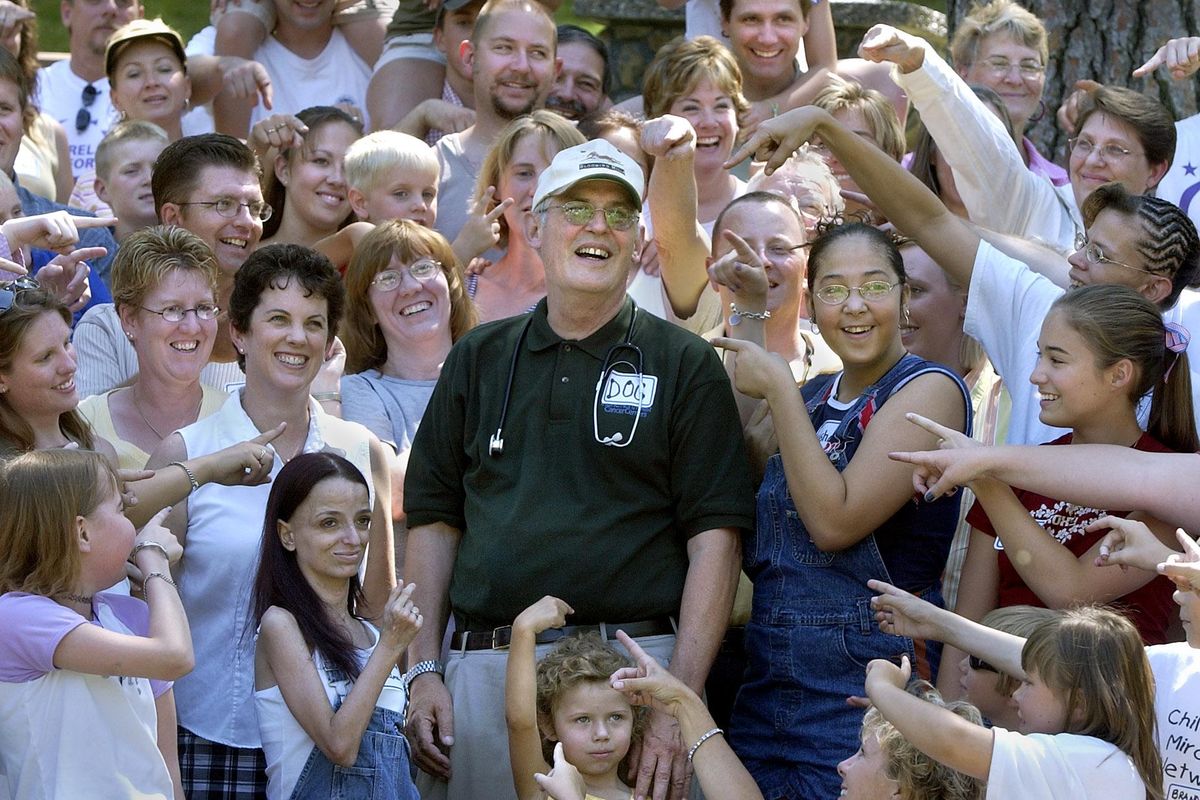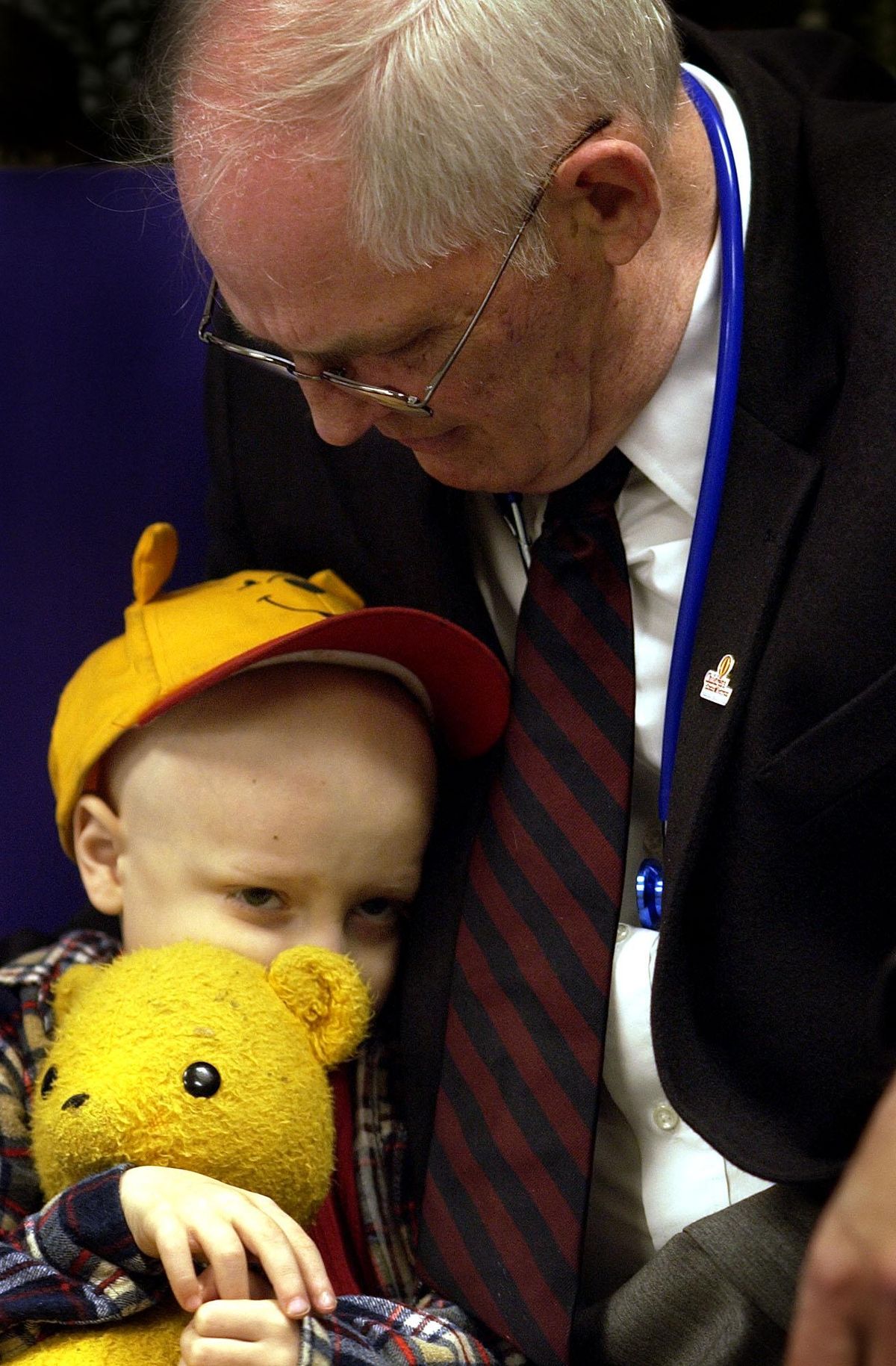Frank Reynolds, beloved child cancer doctor at Deaconess and Sacred Heart, dies at 83

Treating a toddler with leukemia in the early 1970s, physician Frank Reynolds knew he’d be routinely extracting bone marrow with a painful injection that left scars.
So he shifted the needle on the hip bone as he worked with Barbara Rodgers’ young daughter, Laurie.
“He tried not to hit the same spot every time,” Rodgers said. “He made a butterfly.”
Reynolds, a physician who pioneered children’s cancer care in the Inland Northwest with an insistence on honesty and treating patients like family, died Feb. 9 in Spokane. He was 83.
During a medical career that began at Fairchild Air Force Base in the 1960s and ended in January 2010 at Providence Sacred Heart Children’s Hospital, Reynolds saw hundreds of patients inside and outside the office. He is credited with starting the Pediatric Oncology Clinic at Deaconess Hospital in 1982 and serving as its first medical director, as well as assisting with the creation of a summer camp for childhood cancer patients in the early 1980s while still maintaining a general pediatric practice.
“He used to say he had his ‘sick kids’ and his ‘well kids,’ ” said Steve Reynolds, one of Frank Reynolds’ three sons. “He would see up to 80 patients a day, in a little office on Fifth Avenue.”
Current and past cancer patients, along with family and staff, point out Frank Reynolds, Deaconess Medical Center Pediatric Oncology medical director, at a reunion on July 27, 2003, in Manito Park. Reynolds died this month. (Dan Pelle / The Spokesman-Review)Buy a print of this photo
Many of those patients remember Frank Reynolds as a fatherly figure, and a voice of calm and assurance during a time when cancer treatments were still experimental and parents faced financial hardship trying to treat the disease. After Brandy Peterson lost her 10-month-old daughter, Taylor, to cancer in 2005, Reynolds insisted on continuing to meet with her and her husband for as long as they needed him.
“He knew that just because she was gone, that didn’t meant that his job was done,” Peterson said.
That included attending funerals for the toddlers and young adults whose cancer didn’t respond to treatment. Reynolds, in a 1987 interview published in The Spokesman-Review, said it was important to be honest with children and their families.
“You never lie to them,” he said. “They ask me – as young as 5 or 6 years old – ‘Am I going to die?’ I tell them, ‘Yes, but not tomorrow or today.’ ”
At Taylor’s funeral, Reynolds stood in the entryway to the church with Brandy Peterson. While others tried to comfort the grieving mother, Reynolds offered nothing other than his presence, she said.
“He said, ‘Honey, I’m not ready,’ ” Peterson said. “I said, ‘I’m not ready, either.’ So he said, ‘OK, let’s just stand here.’
“I think if I had never been ready to walk into that room, we’d still be standing there.”
In interviews, Reynolds was quick to heap praise on the nursing staff that supported his work. Sue Bilte began working with Reynolds in 1976 at Deaconess, working off and on with the doctor throughout his career before taking a position in the children’s emergency department at Sacred Heart, where she works today as a registered nurse.
“He taught us how to use our instincts, and to be aware of the most minute changes that he wanted to be aware of,” Bilte said. “He taught us to be professional, but also excellent nurses. That’s all I can say.”
Michael D. Wilson, who served as president and chief executive of Sacred Heart Medical Center in the 1990s and 2000s when Reynolds moved his practice from Deaconess to the children’s hospital, called the physician “a pioneer” at a time when few options were available for families dealing with cancer.
“You wouldn’t do that work if you didn’t just love the children that you were working with,” Wilson said. “It’s very emotionally charged work.”
“He was very old school, just a great guy,” said Stephen Luber, a longtime certified pediatrician now with MultiCare Rockwood. “He was a guy that didn’t know what a weekend was if someone was sick.”
Born in Milwaukee, Reynolds attended college and received medical training at the University of Wisconsin in Madison, where he grew up and met his wife, Sally. The couple were married for 61 years, said Steve Reynolds, their son. Frank Reynolds joined the Air Force after graduation in 1958, finishing his 10-year service with a position at Fairchild Air Force Base.
Reynolds left Spokane to study pediatric hematology at Seattle Children’s Hospital, returning in the early 1970s. He stayed in Spokane for the rest of his life.
Reynolds helped his patients tackle not just cancer, but inspired them to share their kindness with others.
Austan Pierce, a patient of Reynolds who had a portion of his hip and one leg removed following diagnosis of a rare bone cancer, wrote a letter with the doctor’s help to Alexis Serna. Serna was a kicker at Oregon State University who had missed three crucial field goals in a 2004 matchup against Louisiana State University, and a 12-year-old Pierce wanted to lift his spirits.
“Dr. Reynolds came in and said, ‘Hey, do you want to write him a letter, and cheer him up?’ ” said Pierce, in a CBS College Sports interview that aired shortly after the letter was sent. The video was posted on Steve Reynolds’ Facebook post announcing his father’s death earlier this month, earning a response from Serna, now an employee of the university helping student-athletes transition from football to other professional careers.
“Steve, I will be forever grateful for your father taking the time to write that letter with Austan,” Serna wrote. “A 19-year-old boy who had no connection to him, he showed compassion during my tough time. That letter helped shaped my outlook in life.”
Reynolds also sought to help the families of the dozens of patients he saw every day. That legacy can be seen in the work of the American Childhood Cancer Association of the Inland Northwest, previously known as Candlelighters.
“Dr. Reynolds knew, if I said, ‘I think something’s wrong here,’ he knew me and knew my motherly instinct,” said Sarah Brown, the director of the cancer association whose son, Parker, received treatment from Reynolds for six years before he died in December 2009. “He said, ‘Let’s get this test done.’ ”
Brown has continued building on the support system that she said Reynolds tried to provide for the families of his patients. The organization provides backpacks full of information, medicine and toiletries for the families of roughly 50 children who are diagnosed with cancer every year in the Inland Northwest. A supply closet is full of toys for “pokey” visits, when young children have their blood drawn for tests, a remnant of the type of care Reynolds sought to provide his patients, Brown said.
After replacing the medicine-giving catheters for young patients at the camp, called “Betchacan,” in 1983, Reynolds would hand out Tootsie Rolls to the children –“a favorite of both doctor and patient,” according to a Spokesman-Review story on the camp.
Reynolds’ work kept him away from home in the Glenrose area on the upper South Hill, said his son, Steve Reynolds.
“A lot of times I wish I could have thrown a football or baseball with my dad,” Steve Reynolds said. “But he tried to make time. He would show up to our significant activities and events. He tried to do it all.”
That included raising horses, a joy that Reynolds shared with children at the camps where he volunteered, said Bilte, the longtime nursing colleague. That included one hot summer afternoon, when a bee stung the horse she was riding with a patient as Reynolds looked on.
“I was horrified, all I could think of was trying to hold on to that kid and not let him fall off,” Bilte said. “Frank was yelling at me, ‘Sue, let that horse have the reins!’ ”
The horse calmed, and later Reynolds insisted Bilte go back out with the child on the same horse, which she did. He showed loyalty and commitment at a time when patients had few options, Bilte said.
“A lot of kids wouldn’t ever have had a chance if he hadn’t taken them, and kept them on treatment,” Bilte said.
One of those children was Laurie, Barbara Rodgers’ young daughter. As one of Reynolds’ first patients in the early 1970s, Laurie was one of the few to experience a “spontaneous remission,” and she’s still alive and well now, some 50 years later.
When she returned to Spokane for the removal of a brain tumor believed to be caused by early radiation treatments, Reynolds was in the room with the same type of teddy bear he’d given Laurie all those years ago, Rodgers said.
“He was that way with all his kids,” Rodgers said.
Reynolds is survived by his wife, Sally; and children Steve, Andy and Tim Reynolds, and Anne Smith. The time and date of funeral services has not been announced.



